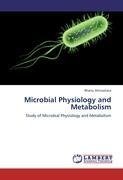
-
 Anglický jazyk
Anglický jazyk
Microbial Physiology and Metabolism
Autor: Bhanu Shrivastava
Metabolism is the mechanism of living cells to extract, convert and store energy from nutrients. Metabolism is a complex network of chemical reactions within the confines of a cell that can be analyzed in self-contained parts called pathways. Metabolic pathways... Viac o knihe
Na objednávku, dodanie 2-4 týždne
73.17 €
bežná cena: 81.30 €
O knihe
Metabolism is the mechanism of living cells to extract, convert and store energy from nutrients. Metabolism is a complex network of chemical reactions within the confines of a cell that can be analyzed in self-contained parts called pathways. Metabolic pathways contribute to catabolism - the oxidative degradation of molecules, and anabolism - the reductive synthesis of molecules. It is important to realize that pathways, be they catabolic or anabolic in nature, are interdependent and controlled (e.g. hormones) by the energy needs (e.g. growth, work, digestion) and physiological activity of an organism. The principals of metabolic pathways can be described by four conceptually distinct categories. Metabolism is a largely circular process of energy conversion in cells of living organisms. Chemical energy is extracted from nutrients (catabolism) and this energy is in turn used to synthesize new molecules (anabolism) from the same type of nutrients to maintain the structure and function of an organism. Living organisms maintain a state of metabolic homeostasis which can be viewed as a steady-state throughput or flow of energy and metabolites to sustain body functions and structures.
- Vydavateľstvo: LAP LAMBERT Academic Publishing
- Rok vydania: 2011
- Formát: Paperback
- Rozmer: 220 x 150 mm
- Jazyk: Anglický jazyk
- ISBN: 9783843316477












